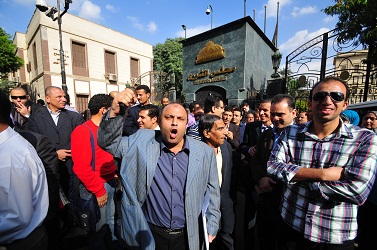Out of time and place, but distinctly relevant to the here and now
CAIRO: Al-Batreeq: Hathayan Fil Ro b Wal Horria (The Penguin: Hallucinations about Freedom and Terror), written and directed by Omar El-Moutaz Bellah, was recently performed at Metropole Theater on the periphery of the 18th Cairo International Festival for Experimental Theater by Tiatro Independent Theatrical Troupe. The outstanding one-hour performance raises many questions while presenting bitter reality. It is a theatrical protest sarcastically performed in formal, yet simple, Arabic.
The play starts with three clowns led by a human penguin announcing a competition featuring a reward. It is about a game played with – or rather on – people. Nobody knows who set the rules, or what the contestants’ choices are. And yet, there are breathtaking announcements and ads everywhere around you. “Come on; send an SMS or call that number and you will definitely win. Among the thousands of calls there is one call; a wrong call from Youssef. Here the plot becomes complicated.
Youssef, played by Ahmed Hamdy, is the only character whose name is revealed to the audience. He wasn’t born a hero. He is a normal human being that you might meet any time and anywhere at work or on the street. But he becomes a person who can have an influence on other people s lives.
The play does not specify a time or a place, and no setting is defined. The incidents taking place in the play could happen anytime and anywhere, possibly in Palestine, Egypt, Iraq or Lebanon.
What sticks out in the audience s mind the most is how excellent the acting and direction is. El-Moutaz Bellah plays the role of the security officer who captures Youssef. Now the game starts. El-Moutaz Bellah’s identity is vague, making it even more thrilling for the audience to guess. He could be an Israeli soldier, an American interrogating Youssef or an Egyptian national security officer trying to force him to confess to something that he never did or knew about until he reaches the point of losing his identity.
The penguin, played by Karim Qadry, hogs the audience s attention all the time. The clown-like penguin is the implicit link or the mediator connecting the parts of the play together. Penguins used to fly centuries ago, but they went through many evolutionary phases until they lost their ability to fly. Usually penguins live in very cold or frozen areas where they wait eagerly for the dawn to come, just like millions of Arabs who wish for freedom and a better tomorrow.
Qadry plays another important character in the same play: a man living in a mask. He thinks that he is protected inside the barrel and he doesn t want to leave it. He acts like a mad man, but in fact may be the only sane person.
The young actresses who played the roles of the distressed wailers in black – whose husbands, brothers or fathers have been detained, tortured or killed somewhere – expressed each emotion with energy and tact. They wail during the celebration of a baby s birth appearing in three scenes. They teach the 7-day-old baby – who symbolizes the only hope they have – to take his revenge and tell him how his people have been subjugated.
On a technical level, not only did the lighting effectively portray the darkness of the theme, it actually set the mood for the entire scene. Stage directions were quite expressive. Sound effects and soundtrack, though simple, were quite influential. The costumes weren t outstanding, but fit each character s role well and added to the whole mood. The simple décor and accessories also contributed to the overall mood.
The play ends with Youssef – the long-awaited hero – crucified while wearing a rag and with his head covered by a black mask. He is the new messiah who dies for the salvation of the Arab people and the Arab man tortured in a prison like that of Abu Gharib in Iraq.
The Penguin: Hallucinations about Freedom and Terror will run at Metropole Theater for a week during Ramadan at the request of Actors Syndicate Chairman and Theater Art House Ashraf Zaki who watched the performance and praised it. It will also be performed in both Hanager Theater and El-Sakia Cultural Center after Ramadan.


